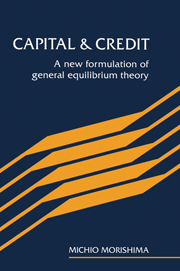Book contents
- Frontmatter
- Contents
- Preface
- 1 Introduction
- 2 Capitalist production
- 3 Production possibility set
- 4 Temporary equilibrium
- 5 Stability and motion
- 6 Innovations and financing
- 7 Monetary disequilibrium
- 8 Perspectives into the future
- Appendix I Existence of temporary equilibrium
- Appendix II Increasing returns
- Index
7 - Monetary disequilibrium
Published online by Cambridge University Press: 21 May 2010
- Frontmatter
- Contents
- Preface
- 1 Introduction
- 2 Capitalist production
- 3 Production possibility set
- 4 Temporary equilibrium
- 5 Stability and motion
- 6 Innovations and financing
- 7 Monetary disequilibrium
- 8 Perspectives into the future
- Appendix I Existence of temporary equilibrium
- Appendix II Increasing returns
- Index
Summary
Regarding monetary theory, two alternative approaches are possible. The first (like Keynes, in the liquidity preference theory of interest) may regard the quantity of money available as a parameter and the rate of interest as a variable to be determined. There is another approach, on the other hand, which considers that the monetary authorities peg down the interest rate and adjust the quantity of money flexibly. In the latter the quantity of money thus determined is taken as the factor determining the level of prices, as the quantity theory of money asserts to do. I consider the second approach to be more appropriate than the first, as it is extremely difficult to satisfy either of the two premises of the first approach: (1) to keep the quantity of money constant and (2) to adjust the rate of interest promptly to the quantity of money so as to establish the Keynes–Hicks LM condition.
The reason is: as for the first premise, if the monetary authorities do not increase the quantity of money in a situation of there being an excess demand for money, various kinds of money substitutes such as bills, drafts or credit cards are produced and anarchism would prevail in the monetary world. The central bank would prefer to adjust the quantity of money to the demand for it rather than to keep it constant. Secondly, the rate of interest for the central bank's loan to the commercial banks, which is called the bank rate, or the discount rate, and plays the most basic role in the system of interest rates, is determined by the committee of the central bank by taking various policy effects into account.
- Type
- Chapter
- Information
- Capital and CreditA New Formulation of General Equilibrium Theory, pp. 169 - 193Publisher: Cambridge University PressPrint publication year: 1992



